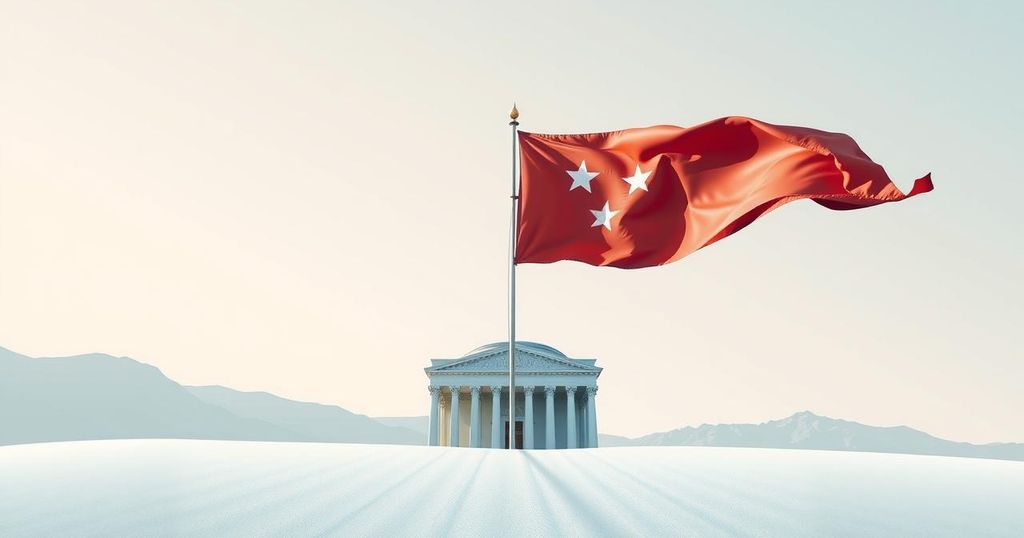Venâncio Mondlane Signals Openness to Serve in Daniel Chapo’s Government
Venâncio Mondlane, Mozambique’s opposition leader, stated he would serve in Daniel Chapo’s government if his demands to resolve the political crisis are met. Chapo is considering including Mondlane in a new inclusive government. Both leaders expressed openness to dialogue, amidst turmoil following the disputed elections that resulted in significant unrest and casualties.
Mozambique’s main opposition leader, Venâncio Mondlane, expressed willingness to serve in President Daniel Chapo’s government, contingent upon meeting his demands to alleviate the ongoing political crisis due to controversial elections. Chapo acknowledged the formation of a team to evaluate the possibility of including Mondlane in a proposed inclusive government. The two leaders conveyed their positions in separate interviews, hinting at a potential reconciliation following unrest that resulted in approximately 300 fatalities.
Mondlane, who rejected his defeat in the October elections, claimed the results were manipulated, an assertion Chapo refuted. The highest court declared Chapo the winner with 65% of the vote against Mondlane’s 24%. Chapo succeeded Filipe Nyusi as the candidate of the ruling Frelimo party, as Nyusi completed two terms.
Following his inauguration on January 15, Mondlane declared himself the “people’s president.” He accused Chapo of being “forced” upon the nation and referred to him as “the president of the defence force.” Despite these accusations, Mondlane agreed to pause his protests for the first 100 days of Chapo’s presidency if specific conditions were met, including the release of roughly 5,000 detained individuals.
Further conditions set by Mondlane included financial compensation for families affected by police violence during protests and medical care for those injured. He stated that if these requests were accepted, he would open discussions; otherwise, he planned to mobilize his supporters for renewed protests. He confirmed his openness to collaborate with Chapo, provided there was a genuine intent for dialogue.
In contrast, Chapo articulated his desire for an inclusive government and to reform issues surrounding electoral laws and human rights. He emphasized ongoing discussions with opposition parties and intentions to expand the dialogue to encompass broader societal segments. Chapo emphasized the importance of the profiles and competencies of potential government members.
At 47, Chapo was selected by Frelimo to engage younger voters facing high unemployment rates. He aims to stimulate local and foreign investment to enhance economic dynamism and create job opportunities for the youth, facilitating their personal and familial stability. Mondlane, who is 50 years old, garnered significant support from young constituents during his campaign, advocating the slogan, “Save Mozambique – this country is ours.” He ran as an independent candidate after departing from the Renamo party, with a minor supportive party winning seats in the parliament during the election.
The political landscape in Mozambique has been fraught with tension following recent elections that many believe were tainted by irregularities. The rival parties, Frelimo and Renamo, have historically been at odds, with the recent elections further exacerbating divisions. The criticism of the electoral process has led to significant unrest, with tragic consequences. The new President Daniel Chapo and opposition leader Venâncio Mondlane represent two conflicting visions for the country’s future, navigating between negotiation and ongoing protests against corruption and injustice.
In summary, Venâncio Mondlane has revealed his willingness to cooperate with President Daniel Chapo’s administration, contingent upon the fulfillment of conditions aimed at addressing the political unrest following disputed elections. This willingness echoes a potential for dialogue between the two leaders, who hold differing views on the elections. Chapo’s emphasis on inclusivity and reform stands in contrast to Mondlane’s demands, appealing to a populace eager for stability and change in Mozambique’s governance.
Original Source: www.bbc.com




Post Comment